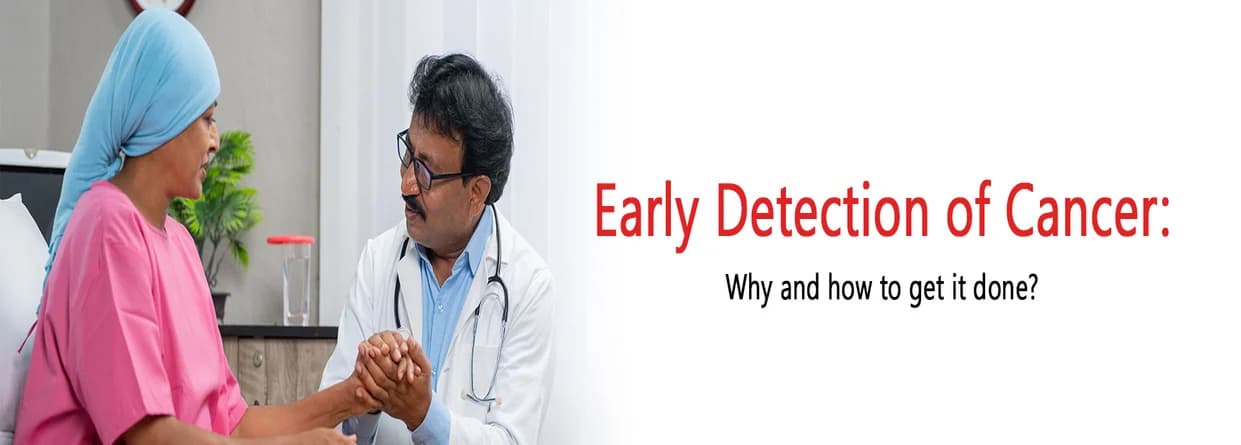
Early detection of cancer can save lives by identifying the disease before symptoms appear. Screening increases survival rates, reduces treatment costs, and protects your quality of life.
Imagine this: You feel healthy, everything seems fine, but silently—without warning—a disease is progressing in your body. Cancer rarely announces its arrival in the early stages. By the time symptoms appear, it may already be advanced. That’s why you're here—looking for clarity, reassurance, and the right information.
This blog is dedicated to you, whether you're someone who wants to stay ahead of health risks or someone supporting a loved one through the journey.
If you're wondering whether early cancer detection really makes a difference, the answer is simple: yes, it can save your life. Finding cancer early means it hasn’t had the chance to grow or spread. And for you, that brings several life-changing benefits:
Cancer screening isn’t just for those with symptoms. It’s meant for healthy individuals to catch cancer before it causes problems.
You should consider screening if you:
Cancer doesn’t discriminate. Screening is preventive, not reactive.
Full body check-up, blood test panels
|
Cancer Type |
Common Detection Tests |
|
Breast |
Mammogram(X-ray of the breast) |
|
Cervical |
Pap smear, HPV test |
|
Colorectal |
Colonoscopy, stool test |
|
Lung (high-risk individuals) |
Low-dose CT scan |
|
Prostate |
PSA (Prostate-Specific Antigen) blood test |
|
Skin |
Full-body skin exam by dermatologist |
|
General |
Full body check-up, blood test panels |
*Note: While blood tests can indicate potential problems, they are not diagnostic on their own.
|
Cancer Type |
Recommended Frequency |
|
Breast (Women 40–74) |
Every 1–2 years (Mammogram) |
|
Cervical (Women 21–65) |
Every 3–5 years (Pap/HPV test) |
|
Colorectal (50–75) |
Every 10 years (Colonoscopy) or annually (Stool test) |
|
Prostate (Men 50+) |
Every 1–2 years (PSA test; discuss with doctor) |
|
Lung (Smokers 50–80) |
Annually (Low-dose CT scan) |
Your doctor may adjust this schedule based on your personal health history and risk profile.
Even with regular screenings, certain warning signs deserve attention:
If these symptoms last more than 2–3 weeks, consult a doctor without delay.
Getting an unexpected result can be worrying, but it’s important to stay calm. Not all abnormal results mean cancer. Further tests such as imaging, biopsies, or specialist consultations will help clarify the diagnosis.
Your doctor will guide you through every step—explaining results, arranging follow-ups, and helping you understand your treatment options if necessary.
Treatment depends on the type and stage of cancer, but early detection often allows for:
Treatments at an early stage are generally shorter, less intense, and have better long-term outcomes.
Yes. While screening helps detect cancer, prevention reduces your chances of ever developing it.
Here are 6 things you can start today:
A healthy lifestyle and regular screening are your best protection.
Choosing the right place for screening is crucial. At CK Birla Hospitals, CMRI Kolkata, we offer:
You can walk in or book a screening package based on your age and health background.
Cancer is a powerful word, but it doesn’t have to be a deadly one. When detected early, many cancers can be treated successfully—and even cured. Don’t wait for symptoms to appear. Be proactive. Get screened. Stay informed.
Your health is in your hands. Start today.
Most screenings are quick and safe, with minimal discomfort and very low risk.
It depends on the cancer type but generally starts between ages 21 and 50.
Self-exams can help you notice changes but should never replace professional screenings.
Costs vary, but many screenings are affordable and may be covered by insurance or health plans.
Healthy habits reduce your risk, but screening remains essential, even for healthy individuals.
Written and Verified by:

Dr. Chanchal Goswami is a Consultant in Oncology at CMRI Hospital, Kolkata with over 36 years of experience. He specializes in breast, thoracic, head & neck, and genitourinary cancers, with expertise in both radiation and radiotherapy care.
Similar Oncology Blogs
Book Your Appointment TODAY
© 2024 CMRI Kolkata. All Rights Reserved.